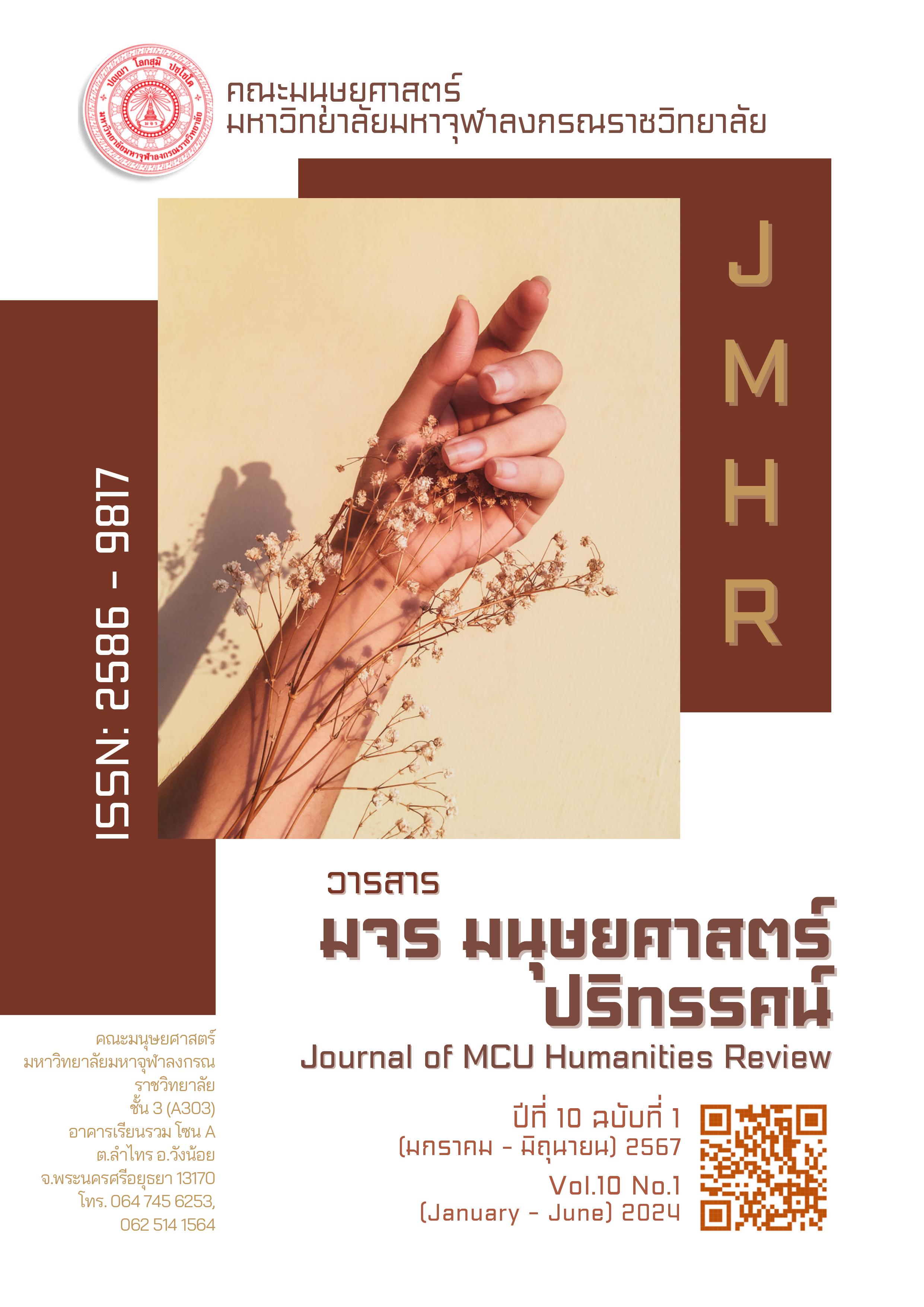ชีวิตสู่ความสำเร็จด้วยการคิดบวก
คำสำคัญ:
ชีวิต, ความสำเร็จ, การคิดบวกบทคัดย่อ
การคิดเชิงบวกเป็นตัวแปรที่บ่งบอกถึงการมีสุขภาพกายและจิตที่ดีของบุคคล เป็นกระบวนการทางจิตที่เกิดการรับรู้และแปลความหมายในทางที่ดี การคิดแต่เรื่องดีเพื่อเพิ่มคุณค่าของชีวิตตามหลักพระพุทธศาสนา เป็นการคิดที่ประกอบด้วยปัญญา การคิดเชิงบวกเป็นทักษะสำคัญของมนุษย์ที่จะช่วยเพิ่มประสิทธิภาพในการดำรงชีวิตและสร้างสรรค์ชีวิตให้ดีขึ้น โดยยอมรับสภาพปัญหาที่เกิดขึ้นในชีวิตตามความเป็นจริง มองปัญหาทุกอย่างให้เป็นประโยชน์สำหรับการพัฒนาตนเอง รู้จักแยกแยะตัวความคิด รู้จักพิจารณาถึงประโยชน์และโทษของความคิด รวมถึง รู้จักใช้เป็นแนวทางในการเรียนรู้สิ่งใหม่ ๆ ที่เป็นประโยชน์ต่อชีวิต รวมถึง การมองวิกฤตเป็นโอกาสสู่ความสำเร็จ ซึ่งการสร้างความสำเร็จของชีวิตด้วยจิตคิดบวก คือ การหามุมมองที่เป็นบวก มีแง่คิดที่ดีที่ทำให้มีกำลังใจในการดำรงชีวิต มีความทุกข์น้อยลง มีความสุขมากขึ้น มีแรงจูงใจที่จะต่อสู้กับชีวิตและสามารถอยู่ในสังคมได้อย่างมีความสุข โดยบุคคลต้องเพียรพยายามน้อมจิตให้คิดดีอยู่เสมอ มีสมาธิในการมุ่งมั่นที่ดี มีพลังแห่งปัญญาเพื่อจัดการกับปัญหาและอุปสรรคของชีวิตให้หมดไป การคิดเชิงบวกตามแนวพุทธจิตวิทยา เป็นกระบวนการคิดไตร่ตรองอันแยบคาย หรือการคิดแบบโยนิโสมนสิการ ที่ประกอบด้วยหลักธรรม “พละ 5” ได้แก่ ศรัทธา วิริยะ สติ สมาธิและปัญญา ที่จะช่วยให้เข้าใจสาเหตุของปัญหาและเข้าถึงเป้าหมายความสำเร็จของชีวิตได้อย่างมีคุณภาพและสามารถดำรงชีวิตได้อย่างมีความสุขตลอดไป
เอกสารอ้างอิง
ทวีศักดิ์ ใหม่ประยูร และพระครูสุธีคัมภีรญาณ. (2560). การปฏิบัติการพุทธจิตวิทยาเพื่อการเผยแผ่พระพุทธศาสนา. ศรีปทุมปริทัศน์ ฉบับมนุษยศาสตร์และสังคม ศาสตร์, 17(2), 18-26.
ปัญจนาฏ วรวัฒนชัย. (2565). การคิดเชิงบวก. วารสารมนุษยศาสตร์และสังคมศาสตร์ มหาวิทยาลัยราชภัฏบ้านสมเด็จเจ้าพระยา, 16(2), 190-223.
พระศรีปริยัติธาดา, ทิพย์ ขันแก้ว และ เอกชัย พัฒนะสิงห์. (2560). การเยียวยาและพัฒนาจิตใจมนุษย์ตามหลักพุทธจิตวิทยา. สืบค้นเมื่อ 8 สิงหาคม 2566, จาก http://wittayalai.com/_files_school/1331100048/document/1331100048_0_20170627-133016.pdf
พระสมุห์วัลลภ วลฺลโภ. (2560). การให้คำปรึกษาและการเสริมสร้างพลังความคิดเชิงบวกในผู้สูงอายุ. วารสารพุทธจิตวิทยา, 2(2), 28-44.
พระอนุรุทธาจารย์. (2556). อภิธรรมมัตถสังคหะและปรมัตถทีปนี. กรุงเทพฯ: ไทยรายวัน.
พุทธทาสภิกขุ. (2548). คิดให้เป็นเดี๋ยวเห็นเอง. กรุงเทพฯ : สุขภาพใจ.
ไพเฟอร์, เวรา. (2548). การคิดแง่บวก [Positive thinking] (นุชจรีย์ ชลคุป, ผู้แปล) กรุงเทพฯ: บลิส พับลิชชิ่ง.
มหาจุฬาลงกรณราชวิทยาลัย. (2539). พระไตรปิฎกภาษาไทยฉบับมหาจุฬาลงกรณราชวิทยาลัย. กรุงเทพฯ : มหาจุฬาลงกรณราชวิทยาลัย.
สุวรรณี ไวท์, สิริวัฒน์ศรีเครือดง และสุวัฒสัน รักขันโท. (2564). พุทธจิตวิทยากับการพัฒนาตนให้มีความสุข. วารสาร มจร มนุษยศาสตร์ปริทรรศน์, 9(1), 1-15.
สมเด็จพระญาณสังวร สมเด็จพระสังฆราชสกลมหาสังฆปริณายก. (2561). หายใจให้เป็นสุข. กรุงเทพฯ : ซไทโลกราฟ.
สมเด็จพระพุทธโฆษาจารย์ (ป.อ.ปยุตฺโต). (2556). วิธีคิดตามหลักพุทธธรรม (พิมพ์ครั้งที่ 26). กรุงเทพฯ : แอคทีฟพริ้นท์.
“_______”. (2557). พุทธธรรมฉบับปรับขยาย (พิมพ์ครั้งที่ 40). กรุงเทพฯ : ผลิธัมม์.
อารี พันธ์มณี. (2564). การพัฒนาความคิดสู่ความเป็นเลิศ. กรุงเทพฯ : พัฒนาศึกษา.
Baughman, John Lee. (1974). Beyond Positive Thinking: The Greatest Secret Ever Told. New York: Harper & Row.
English, Martin. (1992). How to Feel Great About Yourself and Your Life: A Step by Step Guide to Positive Thinking. New York : AMACOM.
Potter, Alice. (1998). Putting the Positive Thinker to Work: 21 Ways 21 Days to a Happy, Fulfilling, Successful Life. New York : Berkley Books.
ดาวน์โหลด
เผยแพร่แล้ว
รูปแบบการอ้างอิง
ฉบับ
ประเภทบทความ
หมวดหมู่
สัญญาอนุญาต
ลิขสิทธิ์ (c) 2024 วารสาร มจร มนุษยศาสตร์ปริทรรศน์

อนุญาตภายใต้เงื่อนไข Creative Commons Attribution-NonCommercial-NoDerivatives 4.0 International License.






